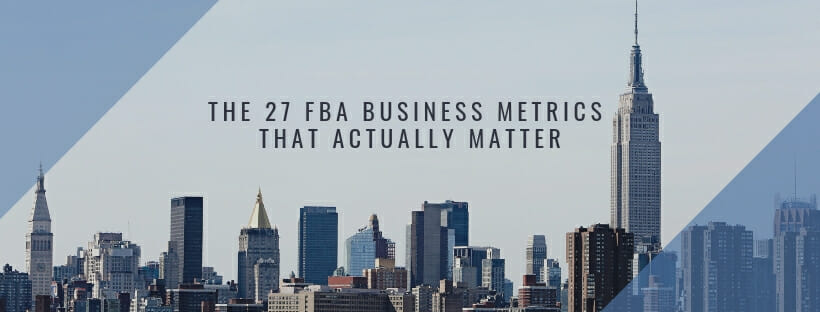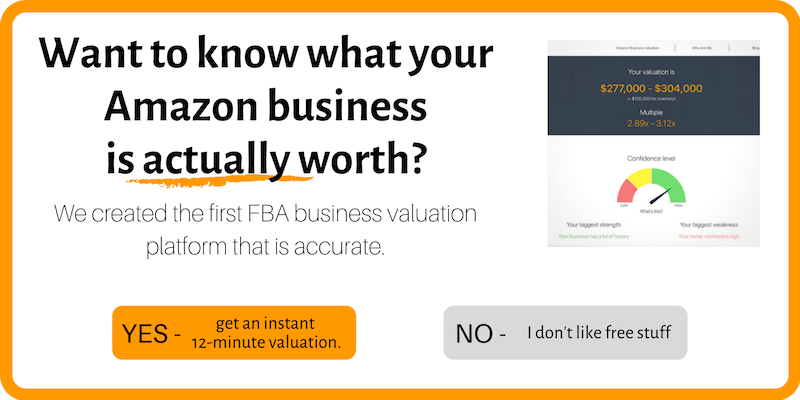
It’s 4am on the west coast. You get a phone call … “Please hold for Mr Bezos”.
The man on the other end of the line is excited. He heard that your Leftist Dog Widgets Inc FBA store is crushing it on his platform … Who knew that widgets for left-pawed pets would be in such demand?
He starts at $20 million. You say no. He pushes to $50 million but before he can finish his sentence you counter … $100 million or no deal Jeff. There’s an awkward pause and he accepts, begrudgingly.
You step outside to find he’s already delivered the money, in cash, in the boot of a Rolls Royce Ghost … which you also get to keep … obviously.
Your plans for the afternoon? Nothing but making it rain.

If you’re that girl/guy, you’ve got no business here. Likewise, if you see yourself running your FBA business until you die, then you’re probably not our audience either.
For everyone else in between – welcome.
I’m going to break down the 27 factors that matter most to an FBA business valuation. Ultimately, this is the price someone would be prepared to pay for your business if you decide to sell and move on to something bigger.
And it’s worth mentioning that these are the 27 factors that matter outside of the obvious – profit (or in most cases SDE).
Before we start though, a quick primer
Value vs Valuation
Contrary to common belief, Amazon businesses, especially those that are 100% or majority FBA, have one of the widest deltas of any online business valuation.
Another misconception is that a business’s value is the same as its valuation.
Amazon business multiples tend to sit between 1.4 – 5.3x annual SDE (seller discretionary income). Due to the formulaic nature of the FBA flavoured e-commerce business model, it’s relatively easy to generate an accurate valuation based on knowing some key things about the business.
In a perfect market, turnover and cash flow rule everything.
In reality, a business with a harsh downwards trend in turnover for example, or one that operates overseas in somewhere like India or Turkey, will never see great multiples because there are fewer buyers competing for that same property.
There are two real components to an fba business valuation – the business’s value and market demand. Both need to be factored in if you want to determine a realistic selling price for a business. In this article, we’ll look at factors that affect both as they’re often intertwined.
The Market
1) Your primary market
Some Amazon markets perform better than others, in terms of buyer appetite. Generally speaking, the market values North American based businesses higher than those that operate in other regions.
In the last year or so, we’ve noticed a change with buyers being more willing to look overseas, as competition for good US listings increases. The strongest growth seems to be in the larger regions (Brazil, China and Japan) and other English speaking regions such as Canada, UK and Australia.
2) Amazon Monogamy
So this metric’s title is work in progress, but do you sell exclusively on Amazon or do you share the love?
Businesses that have another sales channel, such as their own website, tend to perform slightly better and that makes sense. Buyers are aware of Amazon competing against their own merchants, or suspending accounts for reasons outside of the owner’s control, and that makes them nervous. Having another distribution channel helps mitigate some of this risk.
3) FBA or FBM
The ideal scenario for buyers seems to be a business that uses FBA for everything on Amazon, followed a combination of FBA and FBM in the middle, with FBM only negatively affecting an FBA business valuation.
The costs of using 3rd party fulfilment can vary and make it difficult to compete with FBA competitors who take advantage of being able to offer their products through same-day prime.
The Business
4) Your workload
Because no one wants to buy themselves a (poorly paid) job!
The businesses hitting the highest multiples have little to no operational seller involvement, and will have plenty of margin to hire employees to manage the day-to-day. Buyers tend to avoid businesses where the seller commits 40+ hours without being able to pay a salary for someone else to do the same.
5) Employee Count
The number of employees plays a role in most businesses doing over $250k in revenue.
Too many employees mean management overhead. Having just one employee means overreliance on one person that’s statistically likely to quit when a buyer takes over.
Get it just right, and your business gets to show redundancy and scalability.
6) Employee Location
For US buyers, employees also located in the US seem to have the highest value.
We’re not sure exactly why, but at a guess, I would attribute this to ease of working on the same time-zone combined with a lack of language or cultural differences.
7) Employee Type
Remote employees carry the highest value as they mean less overhead and liability for a potential buyer.
Office based employees can be great for team-spirit and culture. They become an issue however when you sell and transfer the business to a buyer who most likely resides in another state, and doesn’t want the office overhead.
8) Number of Vendors
While a ‘good’ number of vendors won’t increase your sales price, having too many or too few can reduce it.
One, or just a few vendors for your product poses a threat if one of those vendors stops trading or has a sudden price increase.
Having too many vendors, while perhaps not as fatal, means additional complexity in the supply chain for a new owner to figure out.
9) Vendor Location
Where your vendors are located (US or China tend to be most acceptable to buyers) and whether or not you have backups will affect market demand for your business, indirectly affecting the valuation.
10) Business Location
Just as your primary sales market can deter buyers if it’s outside of the US, the location of your business can too.
Businesses from outside of the US tend to attract less offers as buyers often struggle with liability and due diligence, and how they would resolve any potential issues with a company in a different legal jurisdiction.
Additionally, a significant amount of businesses between $500K and $2MM are part financed with SBA loans. Non US businesses fail to qualify and this will reduce the amount of buyers available.
11) Separate Company Accounts
When assessing your company’s financials, buyers will want to be reassured that the business accounts they see during due diligence are a full and accurate picture of the business they’re buying.
This is tricky to impossible if your annual accounts contain cost or revenue from another business, meaning less likelihood of a completed sale. The same SBA loan issue from the previous point applies here too. In order to apply for financing, potential buyers will need clear accounts and this is impossible if those accounts contain entries for another business.
12) Business Age
Past a certain point (approximately 5 years), age tends to be less important but young businesses suffer from lower valuations regardless of their performance.
Without a few years of history, it’s often too difficult for buyers to tell just how stable sales are.
The Product
13) Inventory Turnaround
Businesses that need to carry only a small amount of inventory relative to their sales and profit are attractive to buyers due to the comparatively lower working capital requirements.
If your inventory turnaround is too fast, this can indicate the risk of going out of stock.
If turnaround is too slow, this usually signals that there is a lot of stale inventory or at the very least, a significant working capital requirement.
14) Profit Margin
Having a high-profit margin means resilience against the unexpected, such as price wars or increased marketing expenses.
Having high margins also means being able to pay more to acquire a customer and still profit, which opens up channels like Paid Search Advertising, Retargeting and Paid Social.
With the competitive landscape of Amazon heating up, paid acquisition is likely to become an integral part of many FBA business owners’ success, and savvy sellers will pay a premium for businesses that allow this.
15) Product diversity
Having all of your product sales come from just one product is easy to manage, but also dangerous to the future health of your business.
Relying on one product for more than 80% of your sales is fatal. Competitors using grey hat tactics to reduce your rating, Amazon cloning your products and changing consumer trends are all potential issues for a new owner further down the line.
16) Product Uniqueness
Having unique products is a fairly significant factor in increasing your businesses valuation.
Amazon has the amazing (for some!) ability to turn most items into commodities when multiple sellers compete. This can sometimes cause a race to the bottom with sellers trying to stay in the buy box.
If your products are unique, it’s usually an indicator of being able to maintain higher margins in the future.
17) Product Design
Having in-house designed products (or products designed externally to your specification) adds a premium to your business for the same reason having unique products does too.
On the contrary, products that are private label or resold tend to suffer because of the ease of competitors doing the same and creating a new rival offering.
18) Patents and Trademarks
Uniqueness is an asset, but being able to protect it is (in this case, literally) bankable.
A patent reassures a potential new owner that there’s little chance the product will be copied, and also adds some value to the business itself in the event of a future resale.
Likewise, a trademark can protect brands, especially ones based on private-label products, from being hijacked or cloned, which is a common occurrence in competitive niches.
Also, being in Amazon’s Brand Registry is a huge plus too.
19) Total Number of SKUs
This is another one of those ‘happy medium’ metrics.
Too few SKUs and your business appears to be carrying more risk in the event one of those SKUs fails to sell or starts receiving a significant amount of negative reviews.
Too many SKUs can be just as detrimental to your selling price. Buyers typically perceive this as being a lot of extra work required to manage the business, inventory and all the suppliers typically associated with it.
20) Percentage of New SKUs
If your business has multiple SKUs, the percentage of new products to old has a small effect on your valuation too.
Just like having a lack of sales history, not being able to demonstrate stable sales equals risk for a potential buyer.
21) Product Category
The most attractive, and hence most valuable product categories for business buyers are those which are evergreen, resilient to trends and cover a large potential market. For example Cookware, Baby Products or Gardening Tools all tend to be in strong demand.
On the flipside, products that are highly commoditized, have low margins or are extremely niche such as Branded Consumer Electronics, Automotive Parts or Video Games tend to suffer from less demand and hence lower valuations.
It’s not all clear cut though. We’ve seen some categories divide buyers where there’s no predicting whether they will receive a favourable or frosty reception. These categories are typically Supplements, Cosmetic and Beauty products.
22) Category Span
The number of categories you compete in can negatively affect your FBA business valuation. The ideal scenario is to have a few good SKUs in one category, as it’s easier to cross-sell and build trust with the same buyers.
Businesses that span many different categories often lack focus and may struggle to gain traction in any one category.
Sales and Product Performance
23) Sales Trend
A year-over-year increase in sales is a big value-add, as this demonstrates health and sustainability.
On the flip side, if your sales are trending downwards it’s likely you’ll struggle to see more than a ~ 2x SDE valuation. This has more to do with market demand; businesses on a downward trend struggle to find buyers without significantly discounting the price.
24) Repeat Orders
With the competition heating up in nearly every Amazon category, sellers are looking for ways outside of keyword stuffing and “earning” reviews to drive potential buyers to their listings.
A significant percentage of repeat orders means you pay once to acquire a customer, but get to profit multiple times, increasing the range of what you can do to acquire one.
Repeat orders also shows customer confidence in your product – something that buyers tend to value, especially in the health and supplements niche.
25) Seasonality
Businesses that aren’t seasonal tend to attract higher valuations than those that are, and rightly so. Generating revenue only once or twice a year means an increase in both risk and your working capital requirements.
In other words, your Halloween costume business isn’t just scary to 10 year old candy queens … it’s pretty scary to potential buyers too, unless you can find products that sell in other parts of the year.
26) Product Review Count
On Amazon, reviews are everything both for discovery (i.e. where you rank) and for conversion (whether or not people buy from you).
Reviews play such a significant role in an FBA business, product portfolios with a lot of review history always sell for a premium, versus products that have failed to attract a significant amount of reviews relative to their competitors.
27) Average Review Score
Perhaps the caveat to the point above is that high review volume is only useful if those reviews are positive ones.
A very low review score has one of the most detrimental effects to the valuation of an FBA business and is arguably the sign of a product that will soon fail to exist unless it can pull off a turnaround.




